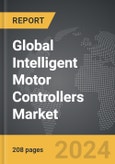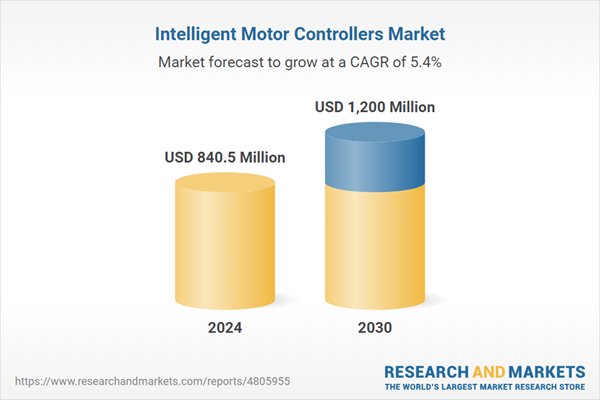Global Intelligent Motor Controllers Market - Key Trends & Drivers Summarized
What Are Intelligent Motor Controllers and Why Are They Integral to Industrial Automation?
Intelligent motor controllers (IMCs) are advanced devices designed to monitor, control, and protect electric motors in industrial applications. Unlike traditional motor controllers, which offer basic on/off control and overload protection, IMCs provide a range of smart features, including real-time monitoring, diagnostics, and communication capabilities. These controllers are integral to industrial automation because they allow operators to optimize motor performance, enhance energy efficiency, and reduce downtime through predictive maintenance. IMCs are used across various industries, including manufacturing, oil and gas, water treatment, and mining, where motor-driven processes are critical to operations. By providing detailed insights into motor conditions and enabling precise control, intelligent motor controllers help improve operational efficiency, extend equipment lifespan, and reduce operational costs.How Are Technological Innovations Shaping the Intelligent Motor Controllers Market?
Technological innovations are playing a significant role in shaping the intelligent motor controllers market, particularly through advancements in digitalization, communication technologies, and data analytics. The integration of IoT and Industry 4.0 technologies into IMCs is enabling real-time data collection and remote monitoring, allowing operators to manage motor systems from centralized control rooms or even mobile devices. Advanced communication protocols, such as Ethernet/IP, Modbus, and CANopen, are enhancing the interoperability of IMCs with other industrial automation systems, facilitating seamless data exchange and more efficient operations. The use of AI and machine learning in IMCs is also becoming increasingly common, providing predictive maintenance capabilities that help operators identify potential issues before they result in costly downtime or equipment failures. Additionally, the development of cloud-based platforms for data storage and analysis is enabling more sophisticated analytics, allowing companies to optimize motor performance and energy use across their operations. These technological advancements are driving the adoption of intelligent motor controllers across various industries, as companies seek to leverage these innovations to enhance their operational capabilities.Why Is There an Increasing Demand for Intelligent Motor Controllers in Industrial Applications?
The demand for intelligent motor controllers is increasing in industrial applications due to the growing need for enhanced efficiency, reliability, and energy management. In manufacturing, where motors are a critical component of production processes, IMCs enable more precise control and monitoring, leading to improved product quality and reduced downtime. The oil and gas industry, which operates in challenging environments, relies on IMCs to ensure the safe and efficient operation of motor-driven equipment, particularly in remote and offshore locations. The water and wastewater treatment industry also sees significant demand for IMCs, as these controllers provide the advanced capabilities needed to manage complex pumping and treatment processes effectively. Additionally, the increasing emphasis on energy efficiency and sustainability is driving the adoption of IMCs, as these devices help optimize motor performance and reduce energy consumption, contributing to lower operational costs and reduced environmental impact. As industries continue to prioritize operational efficiency and sustainability, the demand for intelligent motor controllers is expected to grow.What Factors Are Driving the Growth in the Intelligent Motor Controllers Market?
The growth in the intelligent motor controllers market is driven by several key factors related to technological advancements, industry demands, and the ongoing trend towards digitalization in industrial operations. One of the primary drivers is the increasing adoption of smart manufacturing and Industry 4.0 practices, which require advanced motor control solutions that can provide real-time data and support remote monitoring and control. The growing need for predictive maintenance and operational efficiency is also driving demand for IMCs, as these controllers offer advanced diagnostics and analytics that can help prevent unplanned downtime and reduce maintenance costs. The expansion of industries such as oil and gas, water treatment, and manufacturing, particularly in emerging markets, is creating new opportunities for the deployment of IMCs as these industries seek to modernize their operations and enhance the reliability of their motor systems. Additionally, the rising focus on energy efficiency and sustainability is pushing companies to adopt IMCs that can optimize motor performance and reduce energy consumption. As these factors continue to shape the industrial landscape, the intelligent motor controllers market is expected to experience sustained growth, driven by the need for more advanced and capable motor control solutions.Report Scope
The report analyzes the Intelligent Motor Controllers market, presented in terms of market value (USD). The analysis covers the key segments and geographic regions outlined below.- Segments: Motor Type (AC, DC, Other Motor Types); Application (Pumps, Fans, Compressors, Other Applications); End-Use (Oil & Gas, Power Generation, Water & Wastewater, Other End-Uses).
- Geographic Regions/Countries: World; United States; Canada; Japan; China; Europe (France; Germany; Italy; United Kingdom; and Rest of Europe); Asia-Pacific; Rest of World.
Key Insights:
- Market Growth: Understand the significant growth trajectory of the AC Motor segment, which is expected to reach US$729 Million by 2030 with a CAGR of 5.5%. The DC Motor segment is also set to grow at 5.9% CAGR over the analysis period.
- Regional Analysis: Gain insights into the U.S. market, valued at $231.6 Million in 2024, and China, forecasted to grow at an impressive 5.2% CAGR to reach $183 Million by 2030. Discover growth trends in other key regions, including Japan, Canada, Germany, and the Asia-Pacific.
Why You Should Buy This Report:
- Detailed Market Analysis: Access a thorough analysis of the Global Intelligent Motor Controllers Market, covering all major geographic regions and market segments.
- Competitive Insights: Get an overview of the competitive landscape, including the market presence of major players across different geographies.
- Future Trends and Drivers: Understand the key trends and drivers shaping the future of the Global Intelligent Motor Controllers Market.
- Actionable Insights: Benefit from actionable insights that can help you identify new revenue opportunities and make strategic business decisions.
Key Questions Answered:
- How is the Global Intelligent Motor Controllers Market expected to evolve by 2030?
- What are the main drivers and restraints affecting the market?
- Which market segments will grow the most over the forecast period?
- How will market shares for different regions and segments change by 2030?
- Who are the leading players in the market, and what are their prospects?
Report Features:
- Comprehensive Market Data: Independent analysis of annual sales and market forecasts in US$ Million from 2024 to 2030.
- In-Depth Regional Analysis: Detailed insights into key markets, including the U.S., China, Japan, Canada, Europe, Asia-Pacific, Latin America, Middle East, and Africa.
- Company Profiles: Coverage of players such as ABB Group, Fairford Electronics Ltd., General Electric Company, Larsen & Toubro Ltd., LSIS Co., Ltd. and more.
- Complimentary Updates: Receive free report updates for one year to keep you informed of the latest market developments.
Some of the 11 companies featured in this Intelligent Motor Controllers market report include:
- ABB Group
- Fairford Electronics Ltd.
- General Electric Company
- Larsen & Toubro Ltd.
- LSIS Co., Ltd.
- Mitsubishi Electric Corporation
- Nanotec Electronic GmbH & Co. KG
- NXP Semiconductors NV
- Roboteq Inc.
- Rockwell Automation, Inc.
- Schneider Electric SA
- Siemens AG
This edition integrates the latest global trade and economic shifts into comprehensive market analysis. Key updates include:
- Tariff and Trade Impact: Insights into global tariff negotiations across 180+ countries, with analysis of supply chain turbulence, sourcing disruptions, and geographic realignment. Special focus on 2025 as a pivotal year for trade tensions, including updated perspectives on the Trump-era tariffs.
- Adjusted Forecasts and Analytics: Revised global and regional market forecasts through 2030, incorporating tariff effects, economic uncertainty, and structural changes in globalization. Includes historical analysis from 2015 to 2023.
- Strategic Market Dynamics: Evaluation of revised market prospects, regional outlooks, and key economic indicators such as population and urbanization trends.
- Innovation & Technology Trends: Latest developments in product and process innovation, emerging technologies, and key industry drivers shaping the competitive landscape.
- Competitive Intelligence: Updated global market share estimates for 2025, competitive positioning of major players (Strong/Active/Niche/Trivial), and refined focus on leading global brands and core players.
- Expert Insight & Commentary: Strategic analysis from economists, trade experts, and domain specialists to contextualize market shifts and identify emerging opportunities.
Table of Contents
Companies Mentioned (Partial List)
A selection of companies mentioned in this report includes, but is not limited to:
- ABB Group
- Fairford Electronics Ltd.
- General Electric Company
- Larsen & Toubro Ltd.
- LSIS Co., Ltd.
- Mitsubishi Electric Corporation
- Nanotec Electronic GmbH & Co. KG
- NXP Semiconductors NV
- Roboteq Inc.
- Rockwell Automation, Inc.
- Schneider Electric SA
- Siemens AG
Table Information
| Report Attribute | Details |
|---|---|
| No. of Pages | 208 |
| Published | January 2026 |
| Forecast Period | 2024 - 2030 |
| Estimated Market Value ( USD | $ 840.5 Million |
| Forecasted Market Value ( USD | $ 1200 Million |
| Compound Annual Growth Rate | 5.4% |
| Regions Covered | Global |









